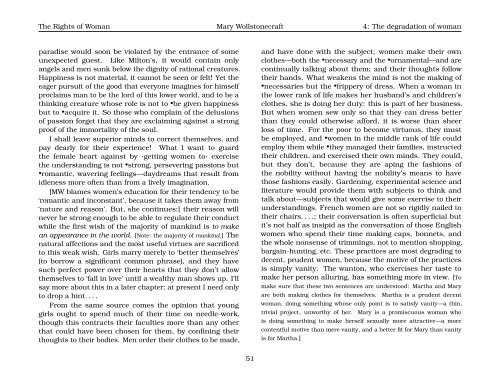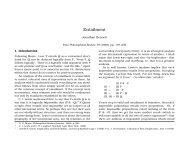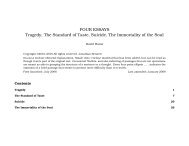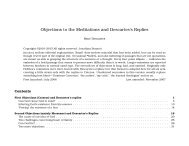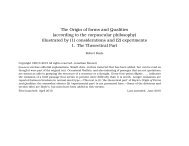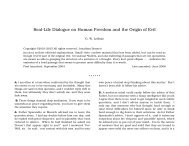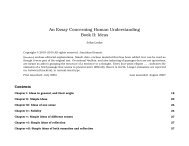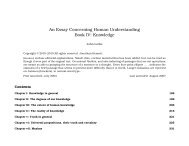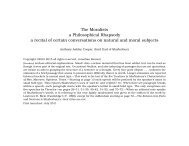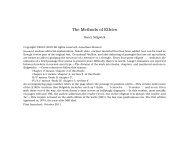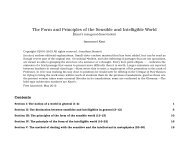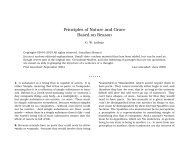A Vindication of the Rights of Woman with - Early Modern Texts
A Vindication of the Rights of Woman with - Early Modern Texts
A Vindication of the Rights of Woman with - Early Modern Texts
You also want an ePaper? Increase the reach of your titles
YUMPU automatically turns print PDFs into web optimized ePapers that Google loves.
The <strong>Rights</strong> <strong>of</strong> <strong>Woman</strong> Mary Wollstonecraft 4: The degradation <strong>of</strong> woman<br />
paradise would soon be violated by <strong>the</strong> entrance <strong>of</strong> some<br />
unexpected guest. Like Milton’s, it would contain only<br />
angels and men sunk below <strong>the</strong> dignity <strong>of</strong> rational creatures.<br />
Happiness is not material, it cannot be seen or felt! Yet <strong>the</strong><br />
eager pursuit <strong>of</strong> <strong>the</strong> good that everyone imagines for himself<br />
proclaims man to be <strong>the</strong> lord <strong>of</strong> this lower world, and to be a<br />
thinking creature whose role is not to •be given happiness<br />
but to •acquire it. So those who complain <strong>of</strong> <strong>the</strong> delusions<br />
<strong>of</strong> passion forget that <strong>the</strong>y are exclaiming against a strong<br />
pro<strong>of</strong> <strong>of</strong> <strong>the</strong> immortality <strong>of</strong> <strong>the</strong> soul.<br />
I shall leave superior minds to correct <strong>the</strong>mselves, and<br />
pay dearly for <strong>the</strong>ir experience! What I want to guard<br />
<strong>the</strong> female heart against by ·getting women to· exercise<br />
<strong>the</strong> understanding is not •strong, persevering passions but<br />
•romantic, wavering feelings—daydreams that result from<br />
idleness more <strong>of</strong>ten than from a lively imagination.<br />
[MW blames women’s education for <strong>the</strong>ir tendency to be<br />
‘romantic and inconstant’, because it takes <strong>the</strong>m away from<br />
‘nature and reason’. But, she continues:] <strong>the</strong>ir reason will<br />
never be strong enough to be able to regulate <strong>the</strong>ir conduct<br />
while <strong>the</strong> first wish <strong>of</strong> <strong>the</strong> majority <strong>of</strong> mankind is to make<br />
an appearance in <strong>the</strong> world. [Note: <strong>the</strong> majority <strong>of</strong> mankind.] The<br />
natural affections and <strong>the</strong> most useful virtues are sacrificed<br />
to this weak wish. Girls marry merely to ‘better <strong>the</strong>mselves’<br />
(to borrow a significant common phrase), and <strong>the</strong>y have<br />
such perfect power over <strong>the</strong>ir hearts that <strong>the</strong>y don’t allow<br />
<strong>the</strong>mselves to ‘fall in love’ until a wealthy man shows up. I’ll<br />
say more about this in a later chapter; at present I need only<br />
to drop a hint. . . .<br />
From <strong>the</strong> same source comes <strong>the</strong> opinion that young<br />
girls ought to spend much <strong>of</strong> <strong>the</strong>ir time on needle-work,<br />
though this contracts <strong>the</strong>ir faculties more than any o<strong>the</strong>r<br />
that could have been chosen for <strong>the</strong>m, by confining <strong>the</strong>ir<br />
thoughts to <strong>the</strong>ir bodies. Men order <strong>the</strong>ir clo<strong>the</strong>s to be made,<br />
51<br />
and have done <strong>with</strong> <strong>the</strong> subject; women make <strong>the</strong>ir own<br />
clo<strong>the</strong>s—both <strong>the</strong> •necessary and <strong>the</strong> •ornamental—and are<br />
continually talking about <strong>the</strong>m; and <strong>the</strong>ir thoughts follow<br />
<strong>the</strong>ir hands. What weakens <strong>the</strong> mind is not <strong>the</strong> making <strong>of</strong><br />
•necessaries but <strong>the</strong> •frippery <strong>of</strong> dress. When a woman in<br />
<strong>the</strong> lower rank <strong>of</strong> life makes her husband’s and children’s<br />
clo<strong>the</strong>s, she is doing her duty: this is part <strong>of</strong> her business.<br />
But when women sew only so that <strong>the</strong>y can dress better<br />
than <strong>the</strong>y could o<strong>the</strong>rwise afford, it is worse than sheer<br />
loss <strong>of</strong> time. For <strong>the</strong> poor to become virtuous, <strong>the</strong>y must<br />
be employed, and •women in <strong>the</strong> middle rank <strong>of</strong> life could<br />
employ <strong>the</strong>m while •<strong>the</strong>y managed <strong>the</strong>ir families, instructed<br />
<strong>the</strong>ir children, and exercised <strong>the</strong>ir own minds. They could,<br />
but <strong>the</strong>y don’t, because <strong>the</strong>y are aping <strong>the</strong> fashions <strong>of</strong><br />
<strong>the</strong> nobility <strong>with</strong>out having <strong>the</strong> nobility’s means to have<br />
those fashions easily. Gardening, experimental science and<br />
literature would provide <strong>the</strong>m <strong>with</strong> subjects to think and<br />
talk about—subjects that would give some exercise to <strong>the</strong>ir<br />
understandings. French women are not so rigidly nailed to<br />
<strong>the</strong>ir chairs. . . .; <strong>the</strong>ir conversation is <strong>of</strong>ten superficial but<br />
it’s not half as insipid as <strong>the</strong> conversation <strong>of</strong> those English<br />
women who spend <strong>the</strong>ir time making caps, bonnets, and<br />
<strong>the</strong> whole nonsense <strong>of</strong> trimmings, not to mention shopping,<br />
bargain-hunting, etc. These practices are most degrading to<br />
decent, prudent women, because <strong>the</strong> motive <strong>of</strong> <strong>the</strong> practices<br />
is simply vanity. The wanton, who exercises her taste to<br />
make her person alluring, has something more in view. [To<br />
make sure that <strong>the</strong>se two sentences are understood: Martha and Mary<br />
are both making clo<strong>the</strong>s for <strong>the</strong>mselves. Martha is a prudent decent<br />
woman, doing something whose only point is to satisfy vanity—a thin,<br />
trivial project, unworthy <strong>of</strong> her. Mary is a promiscuous woman who<br />
is doing something to make herself sexually more attractive—a more<br />
contentful motive than mere vanity, and a better fit for Mary than vanity<br />
is for Martha.]


